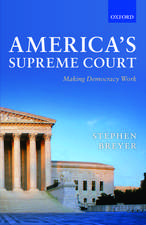The Power of Precedent
Autor Michael J. Gerhardten Limba Engleză Paperback – 28 iul 2011
| Toate formatele și edițiile | Preț | Express |
|---|---|---|
| Paperback (1) | 308.07 lei 31-37 zile | |
| Oxford University Press – 28 iul 2011 | 308.07 lei 31-37 zile | |
| Hardback (1) | 373.22 lei 31-37 zile | |
| Oxford University Press – 13 mar 2008 | 373.22 lei 31-37 zile |
Preț: 308.07 lei
Preț vechi: 349.67 lei
-12% Nou
Puncte Express: 462
Preț estimativ în valută:
58.95€ • 61.55$ • 48.79£
58.95€ • 61.55$ • 48.79£
Carte tipărită la comandă
Livrare economică 25-31 martie
Preluare comenzi: 021 569.72.76
Specificații
ISBN-13: 9780199795796
ISBN-10: 0199795797
Pagini: 368
Ilustrații: 8 b/w illus.
Dimensiuni: 234 x 156 x 19 mm
Greutate: 0.51 kg
Editura: Oxford University Press
Colecția OUP USA
Locul publicării:New York, United States
ISBN-10: 0199795797
Pagini: 368
Ilustrații: 8 b/w illus.
Dimensiuni: 234 x 156 x 19 mm
Greutate: 0.51 kg
Editura: Oxford University Press
Colecția OUP USA
Locul publicării:New York, United States
Notă biografică
Michael J. Gerhardt is Samuel Ashe Distinguished Professor of Constitutional Law and Director of the Center on Law and Government at the University of North Carolina Law School. He is one of the foremost scholars on constitutional conflicts between the president and congress, and he has testified numerous times before congress, including as the only joint witness before the house judiciary committee's hearings on the history of impeachment. He served as CNN's resident expert during President Clinton's impeachment proceedings and a frequent commentator on Supreme Court selection for NPR.
Recenzii
To seek a 'solution' to the problem of precedent is probably like trying to square a circle. Whether or not one agrees with Michael Gerhardt's particular solution, all readers will find themselves illuminated by Gerhardt's consistently interesting arguments (and the data on which they are built) and the insights they throw on the actual operation of the United States Supreme Court and its justices.
Michael Gerhardt's sophisticated and subtle book is the definitive treatment of how precedent really works in constitutional law. It should be the starting point for all future discussions of this important issue.
When the subject is precedent, social scientists and legal academics often talk past each other. Gerhardt takes the time to listen. The result is a sophisticated yet sensible and accessible account of the role precedent plays in judicial decisions. But more than that, it is an account that no side in the debate can afford to ignore because Gerhardt ignores no side. At long last, let the conversation begin.
Michael Gerhardt's sophisticated and subtle book is the definitive treatment of how precedent really works in constitutional law. It should be the starting point for all future discussions of this important issue.
When the subject is precedent, social scientists and legal academics often talk past each other. Gerhardt takes the time to listen. The result is a sophisticated yet sensible and accessible account of the role precedent plays in judicial decisions. But more than that, it is an account that no side in the debate can afford to ignore because Gerhardt ignores no side. At long last, let the conversation begin.















